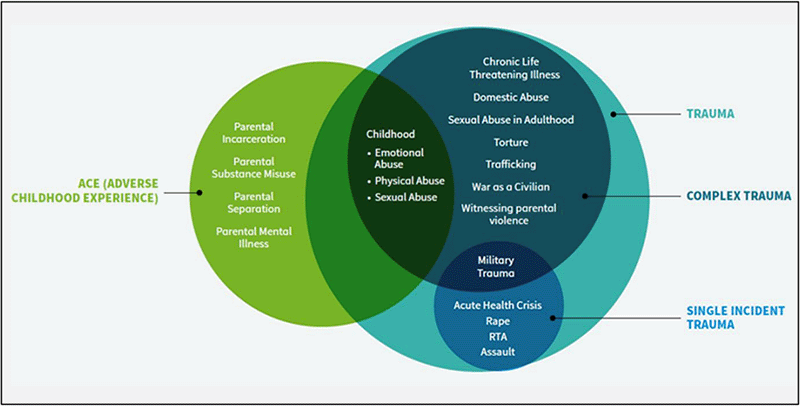The impact of trauma on people with learning disabilities
Written by: Ioana Brezeanu, Policy and Research Officer

The experience of trauma can have lasting effects on the cognitive, emotional and social development of an individual. Recognising the relationship between trauma and learning disabilities is essential for raising awareness, providing support and advocating for effective intervention.
About trauma
Psychological trauma has been defined as ‘an event, a series of events or a set of circumstances that is experienced by the individual as physically or emotionally harmful or life threatening’. (SAMHSA, 2014, p. 7).
What does trauma do to a person?
- It decreases the sense of security and ability to feel love;
- It makes it difficult to control emotions and to calm down;
- It destroys trust in other people;
- It interferes with the development of a sense of self;
- It increases lack of agency;
- It interferes with thinking; the impact can be stronger on people with learning disabilities, as thinking was already hard. (Frankish, 2021; SAMHSA, 2017);
Who experiences trauma?
Research has shown that individuals with a vulnerable social and cultural background are more likely to be affected by trauma and to experience mental health issues.
Furthermore, the past 20 years have seen a growing body of evidence linking experiences of trauma at adult age with Adverse Childhood Experiences (ACEs), such as childhood abuse or neglect (McNally et al. 2021).
ACEs also include things that affect children indirectly through the environment they live in. This could be living with a parent or caregiver who has poor mental health, where there is domestic abuse, or where parents have divorced or separated.

Trauma and learning disabilities
It is increasingly being reported that people with an intellectual disability are significantly more likely to experience adverse life events, abuse and trauma in childhood compared with others in the general population.
In fact, some studies have established that the prevalence of maltreatment for disabled children is 31%, compared to 9% for non-disabled children. This indicates that children with disabilities are 3.4 times more likely to be maltreated than their non-disabled peers (McNally et al. 2021).
Trauma can also be experienced at home, as families of children with learning disabilities suffer more stress which could lead to mistreatment; nonetheless, the rates of sexual abuse that wouldn't be affected by stress is also very high (Skelly, 2021)
What challenges
Myths, misunderstandings and misconceptions have contributed to the under- recognition of trauma impact in this population, and consequently, to the unsuitable care and support provided.
These misconceptions include beliefs that people with learning disabilities do not experience trauma because they do not understand it (e.g., that abuse is wrong), and that they do not comply with treatment because of their limited communication skills (Frankish, 2021)
Additional misunderstandings on the symptoms of trauma, such as the attachment and mental health difficulties impact the understanding of behaviours that challenge, often not seen as a consequence of mistreatment. Although unconditional love and support is also important, services usually make use of behavioural guidelines to reduce behaviours that others find challenging. While caregivers are professional and shouldn't become over-involved, support must be nurturing, and the meaning of behaviour must be recognised.
What needs identified
Firstly, it is important to understand that trauma assessment should be idiosyncratic. This means that what is traumatic for one person isn't necessarily traumatic for another. It depends on many factors such as what state of mind the person is in and the ability to process what happened. For example, when people suffer post-traumatic stress disorder after road traffic accidents, two people in the same car with the same accident can respond very differently to it because they are different people.
A deeper understanding of the impact of early trauma on people with learning disability is also essential. This could look like a traumatic birth deliveries, not being able to feed properly, or being in intensive care and not able to have a close relationship with the primary carer. They could also be traumatised by the arrival of a sibling and retraumatised again if that sibling overtakes them. (Frankish, 2021).
There is, therefore, a need to train carers to recognise trauma, the emotional developmental delay, and the meaning of behaviour. As for some people, their early development has been arrested and they haven't reached a sense of self. The early emotional developmental stage must be recognised and accommodated, accepting the adverse childhood experiences behind the adult persona.
Finally, providing safe places to live that are emotionally nurturing environments and appropriate therapy to address the traumatic memories and process them differently is also essential (Frankish, 2021; Skelly, 2021)
References
NHS EDUCATION FOR SCOTLAND AND SCOTTISH GOVERNMENT, Transforming Psychological trauma: A knowledge and Skills Framework for the Scottish Workers, 2019
SAMHSA (Substance Abuse and Mental Health Services Administration), SAMHSA’s Concept of Trauma and Guidance for a Trauma-Informed Approach, MD: Substance Abuse and Mental Health Services Administration, HHS Publication No. (SMA) 14-4884, Rockville, 2014
SAMHSA (Substance Abuse and Mental Health Services Administration), Tips for Survivors of a Disaster or Other Traumatic Event: COPING WITH RETRAUMATIZATION, HHS Publication No. SMA-17-5047, 2017
McNally P., Taggart L., Shevlin M., Trauma experiences of people with an intellectual disability and their implications: A scoping review, in Journal of applied Research in Intellectual Disabilities, published for the British Institute of Learning
Disabilities, Volume 34, Issue 4, July 2021, pp 927-949
Frankish P., The impact of early trauma on people with learning disabilities, in Learning Disability Today, 18 May 2021; https://www.learningdisabilitytoday.co.uk/the-impact-of-trauma-on-people-with-learning-disabilities
Skelly A., Trauma informed care and intellectual disability, in Learning Disability Today, 19 April 2021; https://www.learningdisabilitytoday.co.uk/trauma-informed-care-and-intellectual-disability